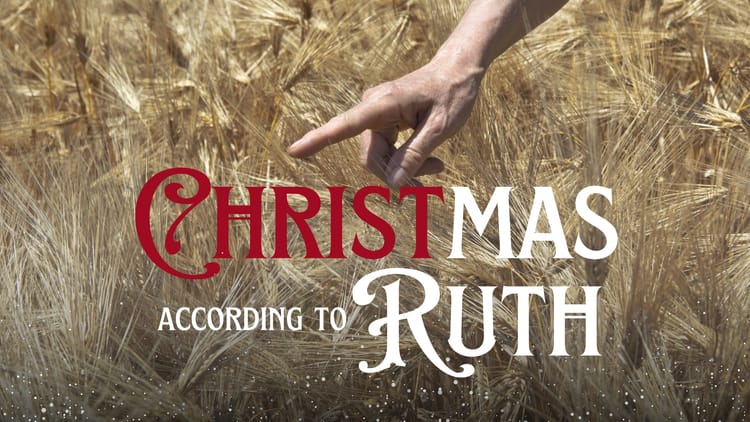They Shall Call His Name Immanuel (Matthew 1:23)

Big Idea: Jesus is the embodiment of God’s presence among his people, the sign that he will save us from our greatest problem.
Have you ever had one of those days? You start out wanting to research something. For instance, you watch an episode of the Crown on Netflix, and you decide you want to learn more about something. You go on the Internet, read an article, and then find a link to another article. Before you know it you’ve read about 5 or 6 articles. You’ve spent a lot more time than you expected, but you’ve also learned a lot.
Hyperlinks are interesting. Click on the right hyperlink and you never know where it may lead!
You may not know that there are hyperlinks in the Bible as well. I got that image from Tim Mackie, co-founder of The Bible Project — a great ministry you should know about if you don’t already.
Here’s what he means. Today’s passage is a good example. In the passage we just read, Matthew describes the events leading up to the birth of Jesus. Mary miraculously conceives a baby from the Holy Spirit. Joseph, her husband-to-be, has a dream in which the angel says, “Joseph, son of David, do not fear to take Mary as your wife, for that which is conceived in her is from the Holy Spirit. She will bear a son, and you shall call his name Jesus, for he will save his people from their sins” (Matthew 1:20-21).
And then Matthew adds his own commentary. He gives us this hyperlink:
All this took place to fulfill what the Lord had spoken by the prophet:
“Behold, the virgin shall conceive and bear a son,
and they shall call his name Immanuel”
(which means, God with us).
(Matthew 1:22–23)
Matthew inserts a hyperlink from the birth of Jesus all the way back to Isaiah 7:14. He’s saying that you can only understand the birth of Jesus if you click on the hyperlink to an earlier passage written hundreds of years before.
So what do we learn about the birth of Jesus by clicking on this hyperlink?
Understanding Isaiah 7
Let’s go back hundreds of years to the world of Isaiah 7, which describes a very unusual story for us.
It’s 735 BC. A huge crisis is exploding on the scene. The Assyrian empire at the east end of the fertile crescent is rising. They’re the first world superpower, the new bullies in town, and they’re taking over everything.
If you were one of the kings in that area, you would be terrified. I would be too. What would you do? It would make sense to form an alliance, because maybe together you’d be able to withstand the new, brutal empire. And so the nations around Judah start to form an alliance. But there’s one holdout: King Ahaz of Judah in Jerusalem. So the coalition decides to get rid of Ahaz. Ahaz is terrified. He’s got the Assyrian empire on one side, and this coalition on the other. Two kings surrounded you. They have a technical name for that: he’s toast. Ahaz is in the crisis of his life.
Thank God that he sent a prophet to help Ahaz. His name is Isaiah, and Isaiah has a simple message: trust God. Isaiah tells Ahaz that the plans against him cannot succeed.
It shall not stand,
and it shall not come to pass…
If you are not firm in faith,
you will not be firm at all.
(Isaiah 7:7, 9)
What I wouldn’t give for someone like Isaiah! Imagine that you were facing the major crisis in your life: you lose your job, you get a terrible medical diagnosis, or you have a major financial crisis, and a prophet came and told you: Don’t be afraid. God has this. All you need to do is to trust him.
Sounds great, doesn’t it? But I know what my first question would be. How do I know if I can trust Isaiah? What if he’s just making it up? And so the LORD says, “Ask a sign of the LORD your God; let it be deep as Sheol or high as heaven” (Isaiah 7:11). “God hands him a blank check, but Ahaz refuses to cash it. Why? He doesn’t want to trust God” (Ray Ortlund, Jr.). So God tells Ahaz what sign he will send. “Not bolts of lightning falling from Heaven on the enemy armies. That would have come in handy! But God’s token of his saving presence is improbable” (Ortlund). “Therefore the Lord himself will give you a sign. Behold, the virgin shall conceive and bear a son, and shall call his name Immanuel” (Isaiah 7:14).
He goes on to say that before this child reaches the age of 12 or 13, the two nations of which Ahaz is scared would cease to exist.
A virgin conceiving and giving child? The name being Immanuel, which means God with us, guiding and helping? What is this all about?
An unmarried woman who is with child and about to bring forth a son, and who will call that son, Immanuel. The infancy of this child will symbolize the fact that the desolation of Judah at Ahaz’ time will be short-lived, for the two enemy kings will soon be rendered powerless. However, to Ahaz a far greater danger will come, namely, the King of Assyria. The prophecy, thus, is fraught with great relevance for the time of Ahaz. Only he who has the eyes to see, however, will understand that relevance. (Edward J. Young)
But for those who have the eyes to see it, God’s deliverance will be unmistakable. This baby will be the embodiment of God’s presence among his people, the sign that God will save.
Sure enough, by the way, this prophecy came true. Assyria crushed both the kings that threatened Ahaz. Assyria saved Ahaz — but ended up being an even bigger problem for him than the two kings that originally threatened him. The person he turns to for salvation becomes the means of God’s judgment. He should have trusted God.
So that’s what the Isaiah 7 story is all about: a scared king who faces insurmountable odds and refuses to trust God and misses out. But it’s also about God who is so gracious that he sends a child as the embodiment of his presence, the guarantee that no enemy is too great for him. God offers salvation — but there’s judgment for those who, like Ahaz, reject it.
Let’s just pause here. I want to pause here for a minute. Do you feel the tension? Didn’t Ahaz just do what any wise individual would do: to examine the very real threats and choose a course of action? Wasn’t he just being prudent?
The Bible isn’t against us taking prudent action. That’s not the issue here. The issue is that he refused to trust God. He took matters into his own hands against a clear direction from God. Whenever we do something that’s prudent and that makes sense, but goes against God’s Word, we’re disobedient. We confess that God is real, but we act as if he isn’t.
I just happened to come across this in the past week:
Sometimes, despite our best intentions, we fail to let God provide for us, and instead we assume control of our destiny … God promises that he will provide for us, but that promise often comes with a challenge. This is not because God wants to be cruel but because he wants us to grow. (James Bryan Smith)
God is gracious. He promises help to his people. He promises his help. He promises his presence — and we’re in danger of missing it if we’re not careful.
Back to Matthew
Okay, back to Matthew.
When Matthew gets to verses 22 and 23, he puts a giant hyperlink back to this story. He expects the reader to click on that link and import its meaning into the passage here. The story in Isaiah provides background and meaning to the events taking place at Christmas. You can only understand the birth of Jesus by clicking on this link and understanding the story of Ahaz.
The birth of Jesus is the ultimate fulfillment of the Isaiah passage. What do I mean by this?
We’re all in trouble.
We’re not in the same kind of trouble that Ahaz is in. We don’t have two kings threatening us. At least I don’t. But make no mistake: we’re in trouble.
In his book The First Chapters of Everything: How Genesis 1-4 Explains Everything, Alisdair Paine illustrates how sin and the Fall have spoiled the blessings God has given:
My parents were once out of the house, but received an alarming phone call to say that there had been a fire. They hurried home to find that some workers mending the gas main outside had caused an explosion in the house boiler. The boiler itself was a charred ruin, but the rest of the house seemed alright. Except, that is, for the smoke damage. Smoke had got round the entire place, and now everything smelled of it. On every wall you could wipe to reveal a thin, grimy film; every picture you took down left a non-smoky mark; every item of furniture smelt burnt. Everything was still there, but nothing was now the same. In a similar way… God leaves us with the blessings he has given, but each one is damaged; each one has, if you like, a spoilt smell about it.
And isn’t life just such a mixed experience? We book that holiday in the sun. It is beautiful, but the brochure never showed us the building site next door, the mosquitoes, the dodgy seafood platter which took the shine off the third night, or the arguments we would have. We spend the last two days of the holiday with a sense of foreboding at the pile of problems which await us on our return. We get back, and with the next pay raise buy a new computer and love the things it can do, but waste frustrating hours sorting out glitches and viruses. We love larking about with our kids, but fret when we hear how unhappy that situation at school has made one of them. We relish the fresh air walk in the park, but are weighed down because we must talk about the divorce of good friends.
Friends, sin has touched every part of life. There’s a technical term for it: we’re toast. Look around and you realize life is a mess. We’re a mess. We’re in trouble.
Our solutions don’t work.
Ahaz thought he could come up with his own solution, but his solution ended up being worse than his problem.
Just like Ahaz, we try to come up with our own solutions to our brokenness. We try to fix our broken lives. We try to improve ourselves. We try to overcome our problems by doing something with our lives. But our solutions just create more of a mess. We’re no better than Ahaz. We turn everywhere to try to repair the damage that sin has brought to the world, but it doesn’t work. It just makes things worse. Don’t be like Ahaz.
God’s solution is easily missed: it’s a child, who is God with us.
Jesus is the ultimate fulfillment of the prophecy in Isaiah. The thing is that the birth of a child is very easy to overlook. Only those with eyes to see it recognize the importance of what happened when Jesus was born.
The birth of Jesus is a turning point of history. It’s God actually becoming one of us. It’s the arrival of the King who will set everything right. Jesus is the sign that God is keeping his promises, that he will deliver us from our greatest problem. He is actually God with us.
But you may easily miss it unless you look. Don’t miss it. Don’t miss God’s sign that he will save us from our greatest problem.
Here’s what this hyperlink means in a sentence: Jesus is the embodiment of God’s presence among his people, the sign that he will save us from our greatest problem.
There’s only one question: how will you respond? Ahaz botched his response, and the sign became a sign of judgment against him, as it will for you if you botch your response.
But for those who trust in God’s sign, he promises deliverance. Jesus is the sign that God keeps his promises, that God is with us, that he will save us.
The only question is: how will you respond?
Lord, help us not to respond like Ahaz, coming up with our own solutions that end up becoming an even greater problem. Help us to respond by seeing who Jesus is — God with us, the one who saves his people from their sins.
Jesus is the embodiment of God’s presence among his people, the sign that he will save us from our greatest problem. May we trust him and follow him. We pray in Jesus’ name, Amen.





